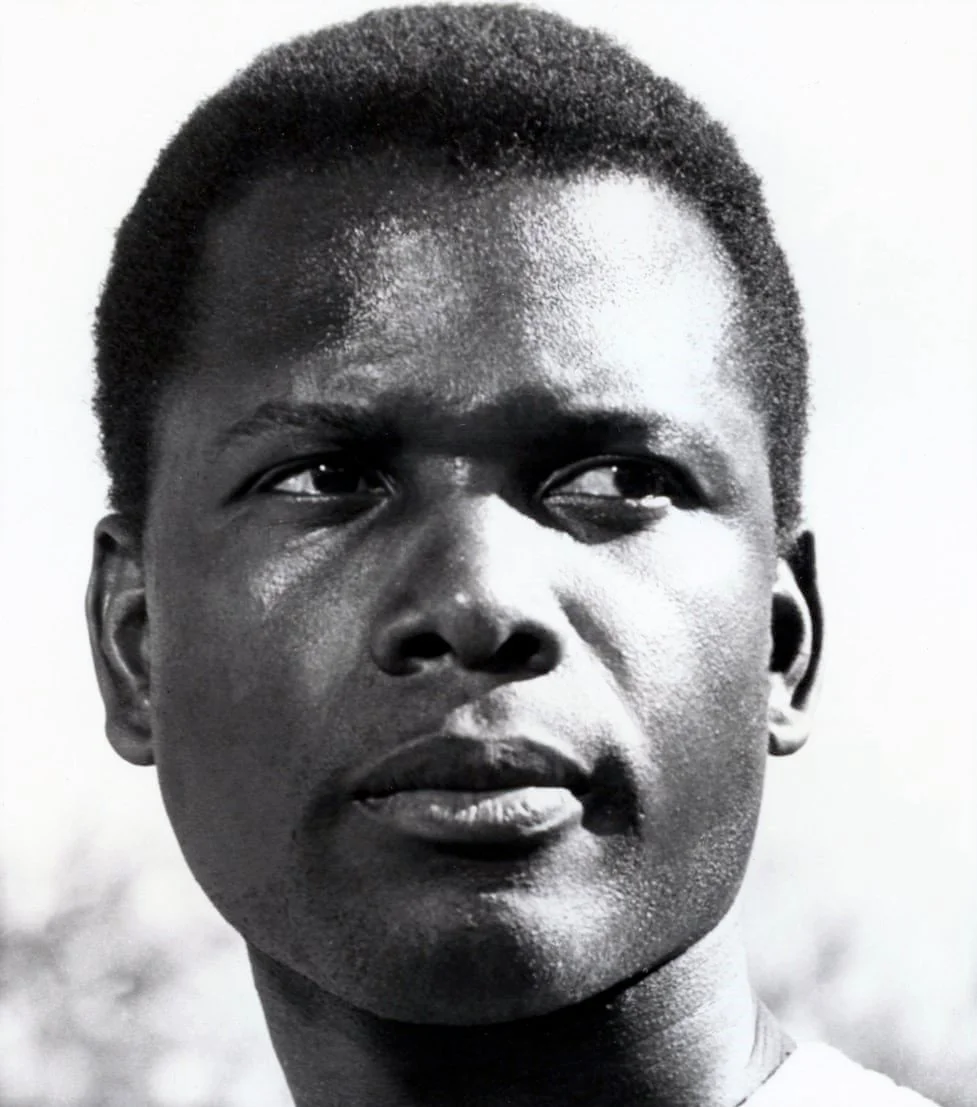SIDNEY POITIER
(20 February 1927 - 6 January 2022)
The Bahamian-American actor and director Sidney Poitier had the great distinction of being the first black person to win an Oscar in the best actor category. Like it or not, he became a film industry symbol, a handsome, black pioneer in an area unused to serious change. From 1950 onwards Poitier became the face of people of colour in the film world. Up until then no black actor had been given a leading role in the movies. Instead, they were often cast in secondary roles as labourers or servants and in the case of females they were usually just maids. The black actress and singer Pearl Bailey once gave advice to a budding black female performer by saying, 'Whatever you do, honey, never carry a tray.'
In his first film of any consequence, Joseph L. Mankiewicz's 1950 film noir No Way Out, Poitier actually played a professional, a doctor who comes up against racism and violence from a vicious robber played by Richard Widmark. The following year saw Poitier in Zoltan Korda's Cry the Beloved Country, from the novel by the South African anti-apartheid writer Alan Paton. The cast was nearly all black with just supporting characters played by white actors. In Red Ball Express, in which Poitier played a corporal in a platoon of racially integrated servicemen at the D-Day landings, the US government asked the filmmakers to tone down the fact that the mainly black platoon was formed of kamikaze pilots. Although the screenplay was about black servicemen, the Army was acting in a racialist way in order to disguise the real truth.
In James Wong Howe's Go, Man, Go! (1954), a film about the Harlem Globetrotters basketball team, its writer-producer Alfred Paica was accused of being a Communist by the FBI, one of the reasons being his casting of Poitier in the film. Paica's name was removed from the movie's credits and he never made another film. However, in 1997 the Academy paid tribute to previously blacklisted writers and directors and Paica's name was restored to the film.
These are the sorts of danger that Poitier faced in his career. In The Blackboard Jungle (1955) he controversially appeared as a black student. Edge of the City, based on Robert Alan Aurthur's TV play, had Poitier in an interracial friendship with a white co-worker (John Cassavetes), much to the disgust of their boss. Something of Value covered colonialism in Kenya; in Band of Angels Poitier played a black slave on a Kentucky plantation; and in The Mark of the Hawk he was an African seeking racial equality in British colonial Africa. The Defiant Ones saw Poitier chained to Tony Curtis as the two of them escape from a Southern chain gang. At Curtis's behest, Poitier's name appeared with his own above the title - for the first time in Poitier's career. It won him a Bafta award for best foreign actor. Further racial controversies were dealt with in All the Young Men, A Raisin the Sun, Paris Blues and Pressure Point, while the controversy over Porgy and Bess came from the black writer James Baldwin who queried why the film was not made by a black director.
While the actor was fast becoming a stereotypical good black guy, Ralph Nelson's Lilies of the Field had no direct racial overtones in its story of an itinerant handyman who builds a church for a convent of nuns. The only controversy may have been a religious one but either way it won Poitier an Oscar for best actor, his first and last for a competitive performance, although he was later given an Honorary Academy Award for lifetime achievement.
Other roles that were definitely controversial included his appearance as a black schoolteacher in To Sir With Love, a police detective in In the Heat of the Night, and a potential son-in-law in Guess Who's Coming to Dinner, the last more of a romcom than a drama as Stanley Kramer's film dealt with an interracial marriage in a more humorous way. All three were made in 1967 while in 1970 They Call Me Mister Tibbs! was a sequel to In the Heat of the Night and another sequel, The Organisation, appeared in 1971. From the 1970s, Poitier began directing films as well as appearing in them and he also made some documentary subjects. He had also appeared on television from 1952 in guest shots as well as TV movies.
Sidney Poitier, who has died aged 94, was born in Miami, Florida, to parents who were natives of Cat Island in the Bahamas, which at the time was still a Crown colony, so in 1994 he was given the honorary title of Knight Commander of the Order of the British Empire by Queen Elizabeth II. He had also received the Kennedy Center Honor and the Presidential Medal of Freedom from Barack Obama. Apart from his Academy Award, he also received a Grammy, two Golden Globes and a Bafta, two Primetime Emmy nominations as well as a Screen Actors Guild Award, an American Film Institute Life Achievement Award, the Golden Globe Cecil B. DeMille Award and a Bafta Fellowship. For ten years he undertook ambassadorial work from the Bahamas to Japan and also from the Bahamas to UNESCO.
Sidney Poitier was married first to the business executive Juanita Hardy from 1950 to 1965. They have four daughters, Beverly, Pamela, Sherri and Gina. He then had a relationship with the actress Diahann Carroll from 1959. He married the actress Joanna Shimkus in 1976, and they have two daughters, Anika and Sydney Tamila.
MICHAEL DARVELL

